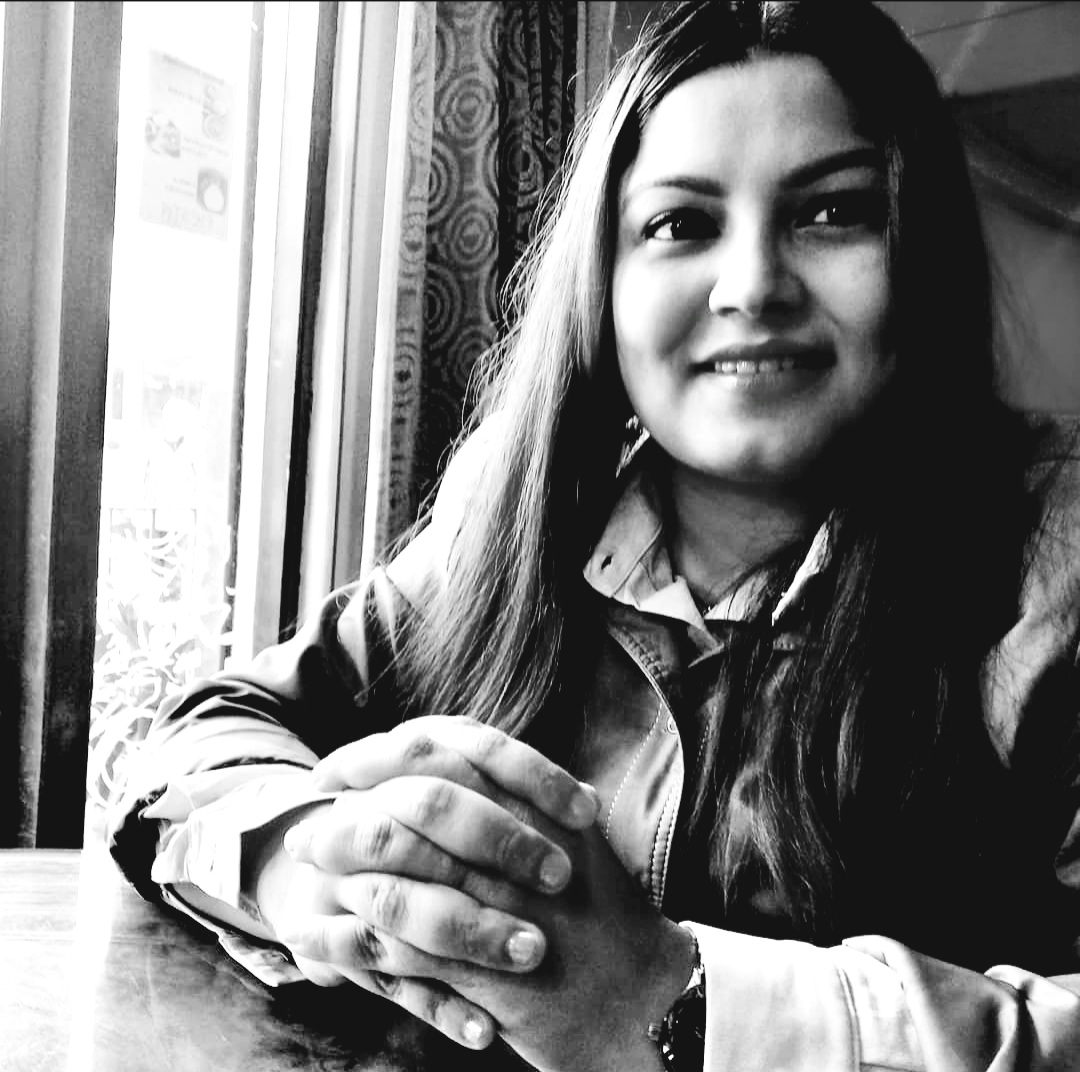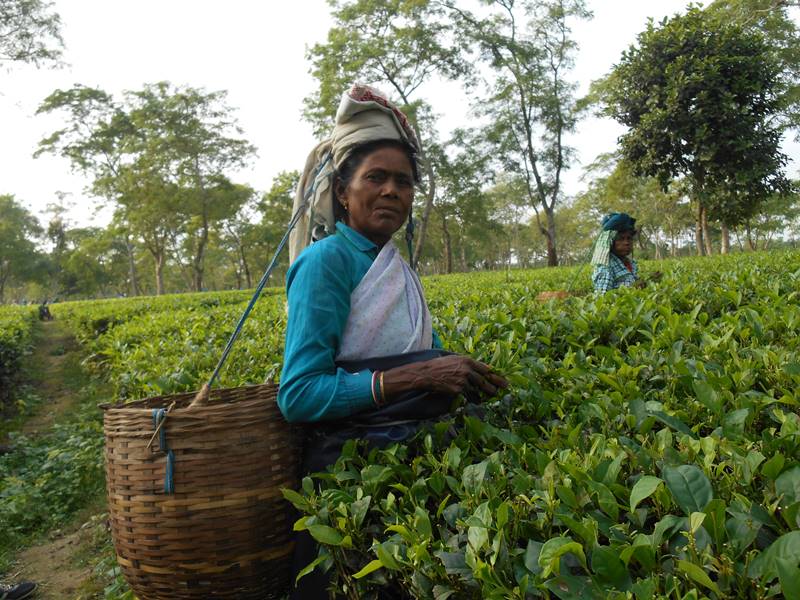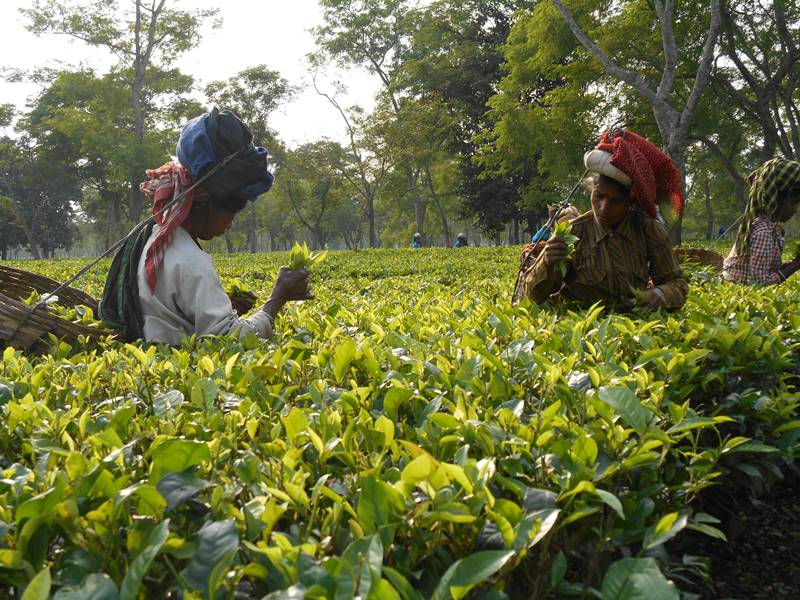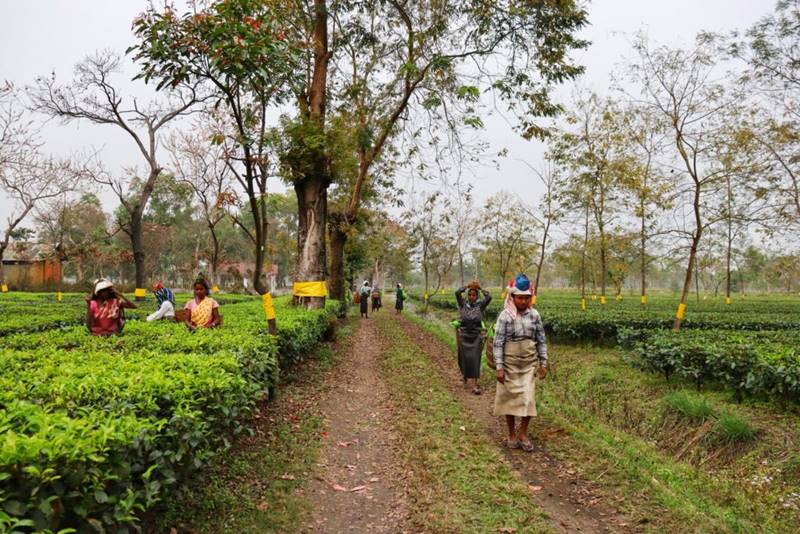COVID19 and rising mental health illness among women tea workers of Assam
The life of women tea-pluckers in the 800 odd tea gardens in Assam, is tough. They have a quota of 15 kgs of tea leaves to pluck a day for which they get paid a daily wage of Rs 275. The pandemic has increased their misery and cases of depression, anxiety disorder, panic attacks, and post traumatic stress disorders have risen. But mental health services are non-existent for these poor women.


Mental health issues are emerging as a very real problem there, more so amongst the women. Photo: Chandrani Sinha
Sivasagar, Assam
Riya Mahananda is eight months pregnant and worried sick. The 25-year-old works at a tea estate in Bamunpukhuri in Sivasagar district, Assam. She worked right up till her seventh month of pregnancy and is now on a paid maternity leave. When she was working, she had to pick her daily quota of 15 kilograms of tea leaves, in order to claim her daily wage of Rs 275.
Taking a day off, or not meeting the quota, translates into a wage cut, which, the to-be-mother said, she could ill afford. But, even now, though she is on maternity leave, Mahananda is a worried woman.
“I can’t help feeling anxious about my unborn child. What if I get corona,” Mahananda asked Gaon Connection. “There is a hospital in the tea garden where I work but rarely is a doctor present there. It is usually the midwives and nurses who deliver the babies,” she said.
Also Read: Assam Election 2021: The story of Assam’s tea workers and broken election promises
The COVID-19 pandemic has made matters worse for the tea-pluckers, primarily women, in the 800 odd tea gardens in Assam. Things became tougher during the second wave where over 500 of the tea gardens in the state were affected with more than 100,000 workers testing positive for the coronavirus, with approximately 100 loss of lives reported. Many of the gardens, especially in upper Assam, were turned into containment zones.
“Some of the women work well into the advanced weeks of pregnancy without having access to even basic facilities such as toilets or even drinking water. This stress combined with domestic violence, substance abuse, and being married off at an early age, has led to mental health problems,” Renuka Gowala, a social activist in issues related to women tea workers, told Gaon Connection.
“And these mental health issues have exacerbated due to the COVID19. Working during the pandemic, fear of the unknown and no support has led to depression amongst many of the women tea pluckers,” added the 55-year-old school teacher from Chakimukh in Sivasagar district who, along with a delegation of tea workers, met Chief Minister Himanta Biswa Sharma last month on August 30 to apprise him on the various problems of women tea workers including the rising mental health problems.
Also Read: Around 12 lakh daily wagers working in tea estates across India are struggling to survive
Mental health of tea pluckers is an area that remains neglected. Most of the gardens do not have psychiatrists or even clinical psychologists, and if one needed to consult them she would have to travel long distances for diagnosis and treatment, Gowla said.

Rising mental health issues among tea workers
Like it has in other parts of the country, the pandemic has brought out the abysmal health infrastructure in Assam, more so in the tea gardens that support a huge community. And, mental health issues are emerging as a very real problem there, more so amongst the women.
“Depression, anxiety disorder, panic attack, addiction, post traumatic stress disorder and psychosomatic disorders are very common among the women tea workers, and most of the time they are not even aware of it,” Nilesh Mohite, consultant psychiatrist, told Gaon Connection. He works with Parivartan Trust and the non profit, the Action Northeast Trust (ANT) that works in the Chirang district of the state. Mohite has been working with tea tribe communities for four years and has worked in tea gardens in Sivasagar, Chabua, Biswanath Chariali, Tezpur, Dhekiajuli and Silchar.
“Mania, schizophrenia, and bipolar conditions are some of the severe mental health illnesses found among tea workers. We have also seen a huge rise in suicidal tendencies during the pandemic,” said the psychiatrist.
Also Read: The pandemic and the mind: Mental health issues are on the rise across categories
There are hundreds of pregnant tea workers like Riya Mahananda who are going through mental stress and trauma as they give birth to their children, and the poor condition of the health infrastructure is not helping them.
“During pregnancy the level of progesterone hormone rises. The COVID situation has pushed the pregnant tea-workers towards more stress,” Sangeeta Dutta, senior consultant, neuropsychiatrist, Medicity Hospital based in Guwahati the capital city of Assam, told Gaon Connection. “Now these women are forced into more contact time with their abusers. And, with the schools shut they have to give more time to their kids as well,” Dutta said, adding how the pandemic has heightened the crisis of mental health amongst the women tea workers.

Poor healthcare system, vacant posts
According to data released by National Health Mission Assam earlier this month, 50 per cent of the tea gardens in the state don’t have doctors in attendance. Sources in the health department of the state, who did not wish to be named, said several health workers’ posts are lying vacant in the garden hospitals.
The vacant positions include 175 posts for health assistants, 200 general nursing and midwifery (GNM) nurses, 660 pharmacists, 300 auxiliary nurse midwife (ANM), 350 laboratory technicians and 600 ward boys. With even the basic medical resources being scarce in the tea gardens, taking care of mental health issues is a far cry.
Also Read: Only 4 psychiatrists for over 10 million population in Uttarakhand; 24 of 28 approved posts vacant
While the medical advisory board for plantation workers had directed that the tea garden hospitals must have a stock of 200 essential drugs, most of them do not have more than 50 of them, the sources in the health department said.
Women tea workers suffer
For Mahananda, her only support system is Jayanti Baag or baideo (sister in Assamese), the 43-year-old accredited social health activist (ASHA) from Nazira, Sivasagar. In fact, in many parts of Assam, it is the ASHA workers who tend to the problems faced by the tea-pluckers who have no one else to turn to. But they are not trained to handle mental health matters.
At Ghoghrajan Tea estate in Dibrugarh district, 455 kms away from Guwahati, it was an ASHA baideo that Shanti Kurmi turned to when she was expecting her baby. The 21-year-old Kurmi, who delivered her second child, a boy, at the Assam Medical College Dibrugarh three months ago, said, “There were no medicines available to me and it was baideo who managed to obtain them for me,” Kurmi told Gaon Connection.
When Assam’s public health facilities were burdened with patients being treated for COVID-19, mental health took a beating too. The lockdown imposed across the state, made accessing health facilities and health providers even more difficult for tea workers like Kurmi and Mahananda.
Also Read: Should India’s health infrastructure embrace traditional midwives?
Keeping in mind the poor health infrastructure in tea gardens of the state, the Assam Tea Tribe Students Association (ATTSA), in a press release on May 7 this year, made a series of demands to the chief minister on behalf of the tea garden community. This included instituting COVID-19 Care Centres with oxygen support in each garden, vaccinations for workers and families, N-95 masks distribution, among others.
Meanwhile, several COVID19 vaccination drives are going on in tea gardens under the National Health Mission Assam, and the Director of Health Service (Family Welfare) to stop the future spread of the virus.
The Assam government claims it has taken active measures such as launching the Wage Compensation Scheme for pregnant women in tea gardens, in 2018. Under this cash transfer programme, pregnant women working in the tea gardens are provided Rs 12,000 by the government.
Also Read: COVID-19 lockdown, erratic rainfall: Small tea growers of Assam suffer major losses
Additionally, the state government has also deployed 130 mobile medical units of which 80 are in the tea garden areas. At present 414 tea gardens are covered by these mobile units every month. The mobile medical units are clinics on wheels with a doctor, nurse, paramedical staff in attendance and equipped with basic free diagnostic services and medicines.
More than 2.03 million patients have been treated in 47,020 camps organised by these mobile medical units between June 2017 and January 2019, as recorded by the National Health Mission Assam. However, these do not address mental health issues faced by the tea workers.

Mental health clinics
Meanwhile, it was in 2017 that the first of the monthly clinics on mental health was set up in Chabua. It was initiated by Jeevan Siksha, a non profit based in Chabua, Dibrugarh district along with the support of Action Northeast Trust.
Forty four clinical workshops have been held in the past four years with several tea gardens also coming within its purview.
These clinics operate mostly in Tinsukia and Dibrugarh district. In 2020-21, the camps that were held even during the pandemic, have seen a rise in the number of patient registrations. Volunteers of Jeevan Shiksha, who are also from the villages in the district, volunteer their time at the clinic camps.
Also Read: “Those working in my tea estate need my help now. I want to help as many”
However, high consultant fees and medicine costs are keeping several tea workers from seeking aid from these mental health camps. “Many have stopped coming because they are unable to pay the fee of Rs 400 for the first registration, and then Rs 350 a month till the patient recovers. The fee includes consultation with doctors and medicine,” Proshik Das, managing trustee of Jeevan Siksha, told Gaon Connection.
“The government does not have adequate resources to support mental health programmes, so we took up the initiative,” the managing trustee said. “We have patients with severe mental disorders in our clinics. Because of a lack of awareness about mental disorders, they come to us only when the disorder takes the shape of schizophrenia, etc.,” Das said.
For most of the tea garden workers, education is a luxury, and because of lack of awareness and extreme poverty, they depend on local quacks and tantriks for treatment. This often pushes the mental health disorders to severe levels, concluded Das.
This story was reported under the National Foundation of India Fellowship for independent journalists. Names of women tea workers have been changed as per request.

